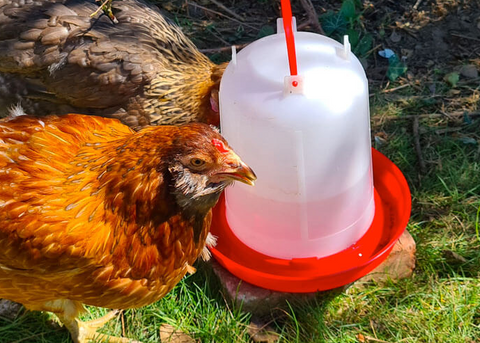Here are some things you can do to prepare.
Prepare your coop
A coop is essential to protect your chickens from cold, wind, and predators year-round. There are several steps you can take to make your coop ready for winter.
Provide roosts


Roosts offer an elevated space for chickens to rest overnight, which keeps them off the cold floor. While roosting, chickens can comfortably lay on their feet to warm them. Roosts should provide enough space for the chickens to fluff their feathers and lay together for warmth without overcrowding.
Generally, roosts should start at least 12 inches above the floor of the coop and provide 9 inches of room per chicken. The exact height and dimension of the roost will depend on the size of your coop.
Avoid using metal, plastic, or other materials that retain the cold and may cause frostbite. Wooden 2 x 4- or 2 x 2-inch boards work well.
Manage drafts and insulate your coop
Inspect your coop for holes and cracks that may allow air to flow freely into the coop. Sealing these spots will prevent cold drafts and rodents from entering your coop over winter.
Keep coops ventilated

Air exchange within a coop is key to preventing moisture build-up and poor air quality due to ammonia. High moisture in a coop, combined with cold temperatures can lead to condensation, which can cause frostbite.
The amount of ventilation you need depends on the size of your coop and flock.
If you smell ammonia or notice moisture collecting on objects or windows within the coop, you need to increase ventilation and clean up manure to help remove moisture.
Manage manure and bedding
Chicken poop is 70% water, which makes manure management key to controlling moisture in your coop. The poop tends to build up under roosts and other perching sites. Installing trays to collect the poop below roosts can make cleaning easy.
You also need to manage poop on the floor of the coop. One option is to routinely pick it up and remove soiled bedding throughout the winter.
Feeding
You can continue to feed your chickens their normal, balanced diet. A balanced diet plays a key role in feather and egg production. Keep in mind that your flock’s feed intake may increase up to 25% during cold weather. Be sure to have extra feed on hand and top off feeders routinely.
Always store feed in an animal and moisture-proof container, such as a metal garbage can, to prevent feed contamination or spoilage.
You will want to provide free access to poultry grit throughout the winter months. Grit helps the chickens break down feed for digestion.
Scratch grains


Scratch grains (Scratch and lay) are mixtures of seeds and grains such as corn ,peas, oats, wheat and barley. As a treat, you should only feed scratch grains in moderation.
Scratch and lay can encourage activity within your flock and reduce boredom, especially when they are kept in the coop over winter. Digestion of scratch and lay also produces heat. So providing scratch grains before roosting can help chickens stay warm on cold nights.
Other treats


There are a number of treats you can give chickens to keep them active and busy during the winter months. Chickens tend to avoid going outside if it snows. If you have access to hay, laying a little bit in the run may encourage your chickens to go outside, scratch around, and forage the hay.
Chickens also enjoy root vegetables, squash and pumpkins. But not all produce is safe for chickens, including potatoes. Make sure a potential treat isn't toxic to chickens before feeding it to your flock.
Seeds and Poultry Pecking Blocks can also entertain your chickens and provide more energy during winter. Remember to feed treats in moderation. Treats should never replace a balanced ration.
Watering

Water is a key part of your flock’s diet and is necessary for digestion. Without water, chickens will stop eating. Your chickens should always have free access to fresh, clean water. During cold weather, you will need to keep your chicken’s water from freezing. There are several commercially available products online.
Place your water source on a stand to keep birds from scratching manure and bedding into it while keeping the heating element away from the bedding.
Routinely check and refresh your chicken’s water. If it is frozen, you may need to bring it into a heated area such as a garage or porch to allow it to thaw. It's a good idea to have a second waterer on hand in case one freezes or stops working.
Managing nest boxes and egg laying

- Continue to keep your nest boxes clean throughout the winter. Replace nesting materials as they become soiled, broken down or sparse.
- Collect eggs as soon as you can. Most chickens finish laying eggs before noon.
- While freshly laid eggs are 42 degrees C, they are largely made of water and are prone to freezing.
- Always inspect your eggs when you collect them and discard any with cracked shells to prevent foodborne illness.
Supplemental light
As daylight shortens, you will want to provide supplemental lighting to encourage egg production.
- For optimal egg production, chickens should have about 14 hours of light daily. You can provide light using a regular lamp and a timer.
- Provide supplemental lighting in the morning hours prior to sunrise. Chickens can not see well in the dark.
- If you add light after sunset, the chickens will not be able to find their roost when the light turns off. The chickens may spend the night on the cold floor.
Frostbite
Most cases of frostbite affect a chicken’s comb, wattles, and feet. These areas may become black or gray in color and feel brittle. The main causes of frostbite are high moisture and cold temperatures. So controlling moisture through airflow and manure management during the winter is critical.
- You can apply petroleum jelly to chicken combs and wattles to help insulate them and prevent frostbite damage. Petroleum jelly does not treat frostbite.
- Consult a veterinarian if you have a chicken with frostbite or infection. If left untreated, severe frostbite can lead to loss of the comb, wattle, or foot.
- If a bird with frostbite gets pecked on by others in the flock, move them to a separate space to allow time for recovery.





